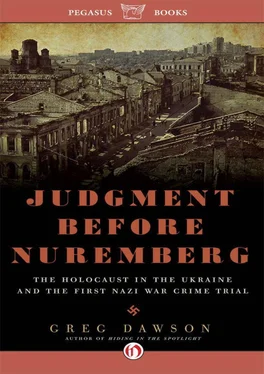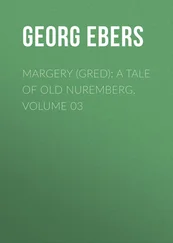Chapter Twenty-Five
Epilogue
Arad, Yitzhak, The Holocaust in the Soviet Union (University of Nebraska Press, Yad Vashem, 2009).
Arendt, Hannah, Eichmann in Jerusalem : A Report on the Banality of Evil (Viking Press, 1963).
Bazyler, Michael, “The Role of the Soviet Union in the International Military Tribunal at Nuremberg and Impact on Its Legacy,” Titel des Artikels.
Berger, Alan and Naomi Berger, Second Generation Voices: Reflections by Holocaust Survivors & Perpetrators (Syracuse University Press, 2001).
Berkhoff, Karel, Harvest of Despair: Life and Death in Ukraine Under Nazi Rule (Belknap Press of Harvard University Press, 2004).
Berkhoff, Karel, “Hitler’s Clean Slate: Everyday Life in the Reichskommissariat Ukraine, 1941–1944,” PhD diss., University of Toronto, 1998.
Blunden, Godfrey, The Time of the Assassins (J.B. Lippincott Company, 1952).
Brandon, Ray and Wendy Lower, eds., The Shoah in Ukraine: History, Testimony, Memorialization. Indiana University Press, 2008.
Brown, Paul, “The Senior Leadership Cadre of the Geheime Feldpolizei, 1939–1945,” Holocaust and Genocide Studies (Fall 2003): 278–304.
Browning, Christopher, Ordinary Men: Reserve Police Battalion 101 and the Final Solution (HarperCollins Publishers, 1992).
Browning, Christopher, “Initiating the Final Solution: The Fateful Months of September–October 1941.” Paper presented at the Center for Advanced Holocaust Studies of the United States Holocaust Memorial Museum, March 13, 2003.
Dykman, J.T., “The Soviet Experience in World War Two.” Paper prepared for The Eisenhower Institute, 2002.
Earl, Hilary, The Nuremberg SS-Einsatzgruppen Trial, 1945–1958 (Cambridge University Press, 2009).
Ginsburgs, George, Moscow’s Road to Nuremberg: The Soviet Background to the Trial (Kluwer Law International, 1996).
Heckler, Cheryl, An Accidental Journalist: The Adventures of Edmund Stevens 1934–1945 (University of Missouri Press, 2007).
Hilberg, Raul, The Destruction of the European Jews (Quadrangle Books, 1961).
Hirsch, Francine, “The Soviets at Nuremberg: International Law, Propaganda, and the Making of the Postwar Order,” American Historical Review (June 2008).
Hollander, Ron, “We Knew: America’s Newspapers Report the Holocaust.” In Why Didn’t the Press Shout? , edited by Robert Moses Shapiro. KTAV Publishing House, 2003.
Ivanova, Elena, “Ukrainian High School Students’ Understanding of the Holocaust,” Holocaust and Genocide Studies (Winter 2004): 402–420.
Kalb, Marvin, “Journalism and The Holocaust, 1933–1945.” In Why Didn’t the Press Shout? , edited by Robert Moses Shapiro. KTAV Publishing House, 2003.
Kladov, Ignatik Federovich, The People’s Verdict: A Full Report of the Proceedings at the Krasnodar and Kharkov German Atrocity Trials (Hutchinson & Co., London, 1944).
Klee, Ernst, Willi Dressen, and Volker Riess, eds., The Good Old Days: The Holocaust as Seen by its Perpetrators and Bystanders (The Free Press/Macmillan, 1991).
Kochavi, Arieh, “The Moscow Declaration, the Kharkov Trial, and the Question of a Policy on Major War Criminals in the Second World War.” History (1991): 401–417.
Kochavi, Arieh, Prelude to Nuremberg: Allied War Crimes Policy and the Question of Punishment (University of North Carolina Press, 1998).
Kruglov, Alexander, “Jewish Losses in Ukraine, 1941–1944.” In The Shoah in Ukraine: History, Testimony, Memorialization, edited by Ray Brandon and Wendy Lower. Indiana University Press, 2008.
Kwiet, Konrad, “Rehearsing for Murder: The Beginning of the Final Solution in Lithuania in June 1941,” Holocaust and Genocide Studies (Spring 1998): 3–26.
Leff, Laurel, “When the Facts Didn’t Speak for Themselves: The Holocaust in the New York Times, 1939–1945.” In Why Didn’t the Press Shout? , edited by Robert Moses Shapiro. KTAV Publishing House, 2003.
Levin, Nora, The Holocaust: The Destruction of European Jewry 1933–1945 (Thomas Crowell Company, 1986).
Lipstadt, Deborah, Beyond Belief: The American Press and The Coming of the Holocaust 1933–1945 (The Free Press, 1986).
Lower, Wendy, “The Holocaust and Colonialism in Ukraine: A Case Study of the Generalbezirk Zhytomyr, Ukraine, 1941– 1944.” Paper presented at the Center for Advanced Holocaust Studies at the United States Holocaust Memorial Museum, September 2005.
Margry, Karel, “The Four Battles for Kharkov,” After the Battle (2001).
Matthaüs, Jürgen, “Controlled Escalation: Himmler’s Men in the Summer of 1941 and the Holocaust in the Occupied Soviet Territories,” Holocaust and Genocide Studies (Fall 2007): 242.
Meehan, Meredith, “Auxiliary Police Units in the Occupied Soviet Union, 1941–43: A Case Study of the Holocaust in Gomel, Belarus.” Honors thesis, United States Naval Academy, 2010.
Podolsky, Anatoly, “A Reluctant Look Back: Jews and the Holocaust in Ukraine.” Osteuropa (2008).
Pohl, Dieter, “The Murder of Ukraine’s Jews under German Military Administration and in the Reich Commissariat Ukraine.” In The Shoah in Ukraine: History, Testimony, Memorialization, edited by Ray Brandon and Wendy Lower. Indiana University, 2008.
Prusin, Alexander, “Fascist Criminals to the Gallows!: The Holocaust and Soviet War Crimes Trials, December 1945–February 1946.” Holocaust and Genocide Studies (2003).
Quigley, John, “Soviet Influences on International Criminal Law in the Nuremberg Era.” Review of Moscow’s Road to Nuremberg: The Soviet Background to the Trial, by George Ginsburgs. Criminal Law Forum, 1996.
Rhodes, Richard, Masters of Death: The SS-Einsatzgruppen and the Invention of the Holocaust (Vintage Books, 2003).
Rubenstein, Joshua and Ilya Altman, eds., The Unknown Black Book (Indiana University Press, 2008).
Telushkin, Joseph, Jewish Literacy: The Most Important Things to Know about the Jewish Religion, its People, and its History (William Morrow and Company, 1991).
Todd, Albert, ed., The Collected Poems, Yevgeny Yevtushenko, 1952–1990 (Henry Holt and Company, 1991).
Wortman, Marc, The Bonfire: The Siege and Burning of Atlanta (PublicAffairs, 2009).
A host of people helped in big and small ways to bring this book to fruition, but there are two without whom the first word never would have been written. Larisa Volovik and her daughter Yulana Volshonok operate the Kharkov Holocaust Museum where I learned about the historic 1943 trial that history forgot. Had I not happened across an exhibit on the trial during a visit to the museum in 2006, there’s little chance I ever would have known about it.
When I returned to Kharkov in December 2010 to do research for this book, I would have been little more than a sightseer without the help of a small village of friends and strangers. I would have been speechless without my gifted and patient translators—Daria and Victoria Plis, and Anna Kakhnovska. I’m grateful to Mariana Yevsyukova for introducing me to Daria and Victoria, and to her grandmother, Antonina Bogancha, for welcoming me into her home as she did in 2006—the same home where the Bogancha family sheltered my mother and her sister after their escape from the death march to Drobitsky Yar.
Victor Melikhov provided an invaluable seminar on Ukrainian history, telling me things I would not have discovered on my own. Yuri Radchenko took time out from his doctoral studies in Holocaust history to show me the places in and around Kharkov where Jews were jailed, murdered, and buried. Moshe Moskovitz, chief rabbi of Kharkov, shared his own story as a Second Generation survivor and told me what life is like today for Jews in Kharkov.
Читать дальше












